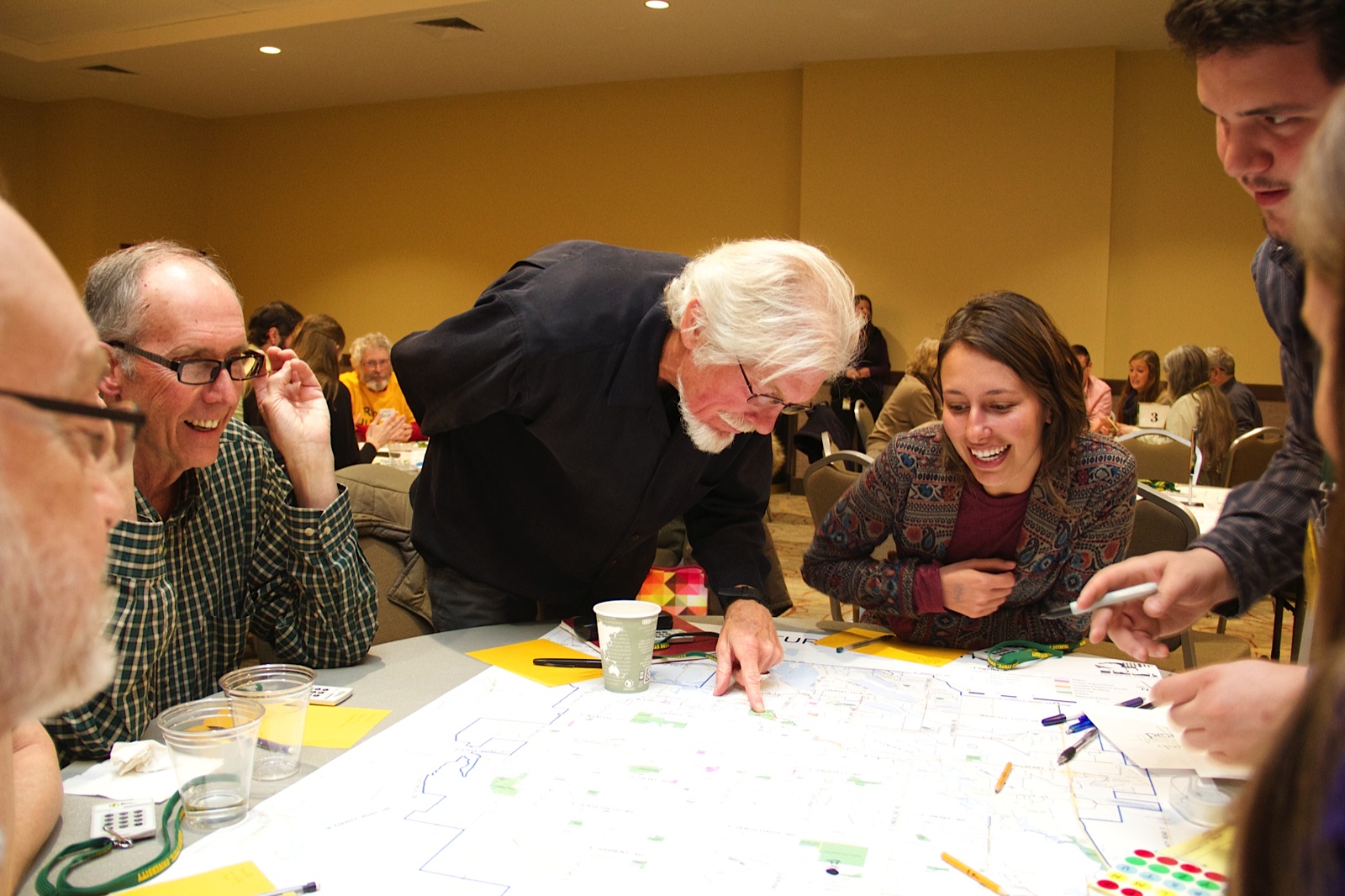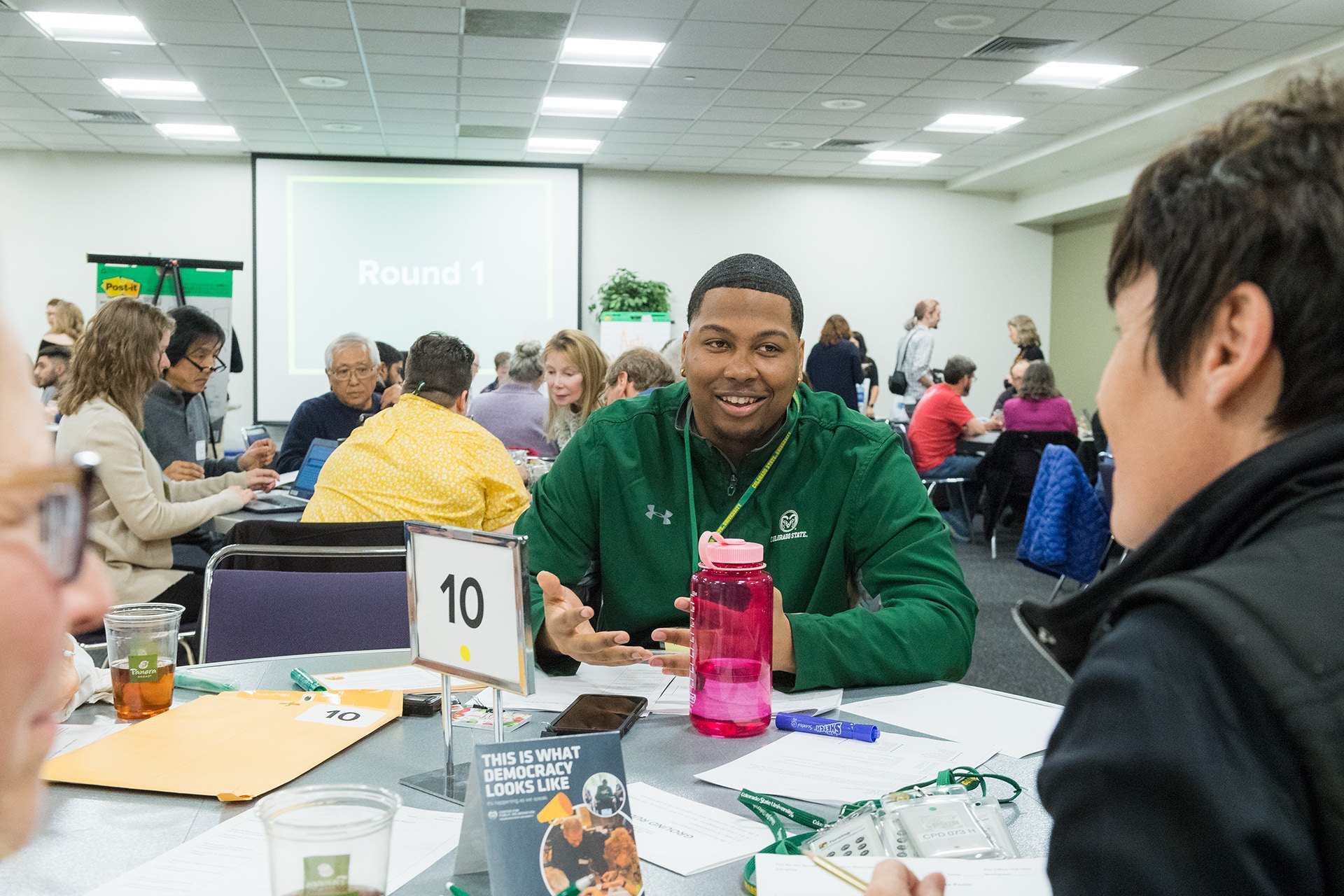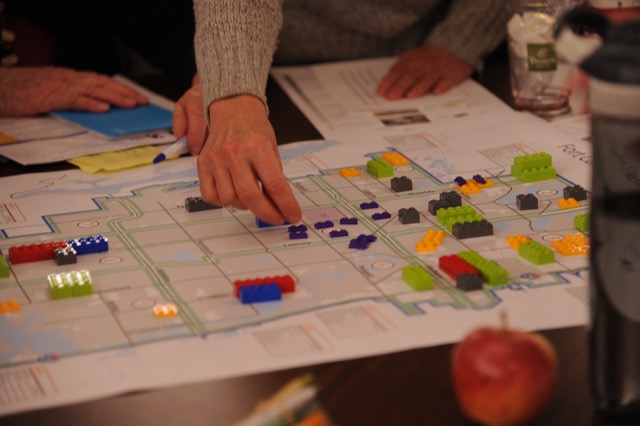By Martín Carcasson

About 10 years ago, I attended a public engagement training with a room full of municipal employees from various city departments. At one point, the trainer asked the group whether it would be a good thing or a bad thing if no one showed up for a public meeting. I quickly realized I was perhaps the only person in the room who assumed it would be a bad thing. During conversations throughout the rest of the workshop, it became clear that many of the participants had numerous negative experiences with the public. When people showed up at meetings, it seemed, it was primarily because they were angry (and often misinformed) and only there to complain. Given the choice of angry or absent, absent seemed clearly superior.
In order to address the complex “wicked problems” that require robust public involvement and ongoing engagement across governmental, private and nonprofit lines, however, local governments must find ways of getting beyond the Hobson’s Choice between angry engagers and non-engagers. Thankfully, as we learn more about wicked problems and social psychology and develop processes that are up to the challenges of the former by applying what we have learned about the latter, there are ways to get beyond the limited options of choosing between angry or absent. A necessary shift is for local officials to see and engage the public not merely as customers, voters, or contently absent and busy people, but rather as potential problem solvers and co-creators. Such an argument, however, brings forth age old questions about what we can expect from citizens and whether our hopes of an engaged citizenry are outdated and disconnected from human nature.
This essay takes on those questions by laying out an alternative vision of civic engagement based on a new ideal role for citizens: the citizen as a wise collaborator. While this is certainly an ideal—something to strive toward even though it is not ultimately fully attainable—it might serve well as an inspirational goal both for civic education broadly and for public engagement efforts specifically. My argument is based on insights derived from research in social psychology, as well as extensive experience in public engagement at the local level. The goal is to get beyond the dual limits of angry or apathetic and develop an alternative that makes sense with what we know about human nature and interaction and can inspire communities in positive ways that enable them to take on the challenge of wicked problems.
The division and hyper-partisanship in our society has reached such a level that productive political engagement is becoming exceedingly difficult on any issue, regardless of the merit of any particular perspective. A key aspect of this negative situation is a political system that brings out and rewards the worst human impulses (cognitive biases, political tribalism, the need for certainty, the preference for simple “good v. evil” stories) and rarely taps into critical positive aspects of human nature that democracy relies on (namely, our potential to be creative, collaborative problem-solvers). The wise collaborator ideal is specifically designed to help counter that reality.
As a deliberative practitioner, I see two primary and interconnected mechanisms for working toward this new ideal: civic education and deliberative public processes. The first focuses more on long-term capacity, whereas the second focuses more on immediate short-term engagement. Much of my work is focused on the latter, and indeed deliberative practitioners often design processes based on the assumption that many who attend will be partisan and angry. Quality deliberative processes, however, can overcome that challenge, at least for the people in the room. In large part this is because we strategically create an environment that works to mitigate the worst in human nature and bring out the best.
When our processes work well, we transform people, at least temporarily, into wise collaborators. After twelve years of designing and running such processes, however, I have begun to see the positive impacts of what happens when even a low but growing percentage of attendees—often participants from previous deliberative events—arrive with a collaborative rather than adversarial mindset. Rather than attending to simply express their point of view and persuade others to it, they arrive intent on learning and helping others work through the issue. In a phrase that captures the mission of the Center for Public Deliberation, they are focused on elevating the conversation, rather than merely trying to win an argument.
“The division and hyper-partisanship in our society has reached such a level that productive political engagement is becoming exceedingly difficult on any issue, regardless of the merit of any particular perspective.”
At the same time, I have realized the limits of relying on deliberative forums to spark these transformations. Only a small number of residents will attend such forums, and often the broader conversation remains polarized and unproductive. To develop viable deliberative systems in our communities, we need to focus on both long-term civic education as well as short-term engagement processes to equip our citizens with the skills democracy requires. It is a thought experiment of sorts of what could happen if we reimagine the ideal role of the citizen to match what we know about human nature and engagement and adjust our citizen training to fit. To lay out my argument, I first consider the current ideal—informed and engaged citizens—and show why it falls short. I then turn to the key aspects that distinguish the wise collaborator ideal.

The Limits of the Informed and Engaged Ideal
As I reviewed the literature on civic education at the K-12 and higher education levels, the most common adjectives used to describe what they offered as an ideal active citizen are “informed” and “engaged.” Unfortunately, this ideal has proven problematic when considered through the lens of social psychology and our hyper-partisan political reality. Here again is where both how we equip our citizens and how we engage them matters. The growing work in social psychology shows that when adversarial or polarized mindsets dominate, the quality of the learning and engagement clearly suffers. We are particularly susceptible to multiple inherent biases and quirks of human nature that work to create a sense of certainty in the goodness of our side and wickedness of the other.
I would argue that the “informed and engaged” ideal – considering its overarching foci on voice, voting, and/or activism – more often than not simply fuels these adversarial mindsets. The ideal is too individualistic, which, combined with political processes that primarily provide opportunities for individual expression, leads to people simply talking past each other. As such, it is much more likely to develop partisans and ideologues. In a way, “informed” is too generic. It focuses primarily on the distinction between uninformed and informed but does not clearly engage the more difficult distinction between informed and misinformed. Many become “informed” by acquiring knowledge though partisan filters that reinforce bias, which is how our brains prefer things, and the internet, activist groups, and the current media climate are happy to help. The bottom line is that the combined effects of selective exposure and confirmation bias, along with numerous other similar concepts, work to undermine and corrupt the “informed and engaged” ideal and further contributes to our hyper-partisan environment.
The Potential of the Wise Collaborator Ideal
The alternative of the wise collaborator was developed based on research and practice related to wicked problems, social psychology, conflict management, and deliberative processes. It seeks to be inspirational yet practical and grounded, negotiating that difficult tension at least at a local level. The wise collaborator involves several key components, three of which I highlight here. First and foremost, it foregrounds the importance of wisdom and judgment. By “wise” in this context I mean knowledgeable, but with a healthy recognition of the limits of knowledge and the inherent dangers of certainty. Wise individuals maintain what Carol Dweck called a “growth mindset” or others have termed “intellectual humility,” knowing they can always learn more and that recognizing what they do not know yet is critical.1
TED Talk by Carol Dweck
Wisdom is growing in importance because of the impact of the internet and the exponential availability of data and information and other things that attempt to pass as knowledge. A focus on wisdom and judgment foregrounds the necessary shift from a focus on being “informed” (which too often simply means cherry picking information that fits your prior beliefs) to being wise, a much higher and more interesting ideal. Ultimately, the goal is good judgment: the ability to make quality decisions that consider and negotiate between multiple perspectives while also recognizing information will always be incomplete.
A second key component to the wise collaborator is a basic understanding of wicked problems and social psychology. Many of the most difficult issues we engage, whether at the interpersonal, organizational, or community level, can be addressed more productively when considered through a wicked problem lens that highlights the inherent values and tensions and sets people up to do the critical process of working through those tensions and co-creating productive responses. Unfortunately, our brains (and most of our political processes) are wired more for polarization and tribalism. These impulses are a particularly bad fit with wicked problems, precisely because it is much more natural for us to simplify issues, focus only on our preferred particular values tied to the issue, and assume those who disagree with us either reject those values or hold malicious motives. In other words, we prefer assuming problems are caused by wicked people rather than placing the wickedness in the problem. The good news is that the more aware people are of how their brains inherently want to polarize and simplify tough issues, the more likely they are to avoid those easy paths.
Said differently, knowledge of wicked problems and social psychology can essentially function as an inoculation against hyper-partisanship. The goal is through education and training to shift our inherent polarization-ready brains to be more polarization-resistant and deliberation-ready. This must become a basic part of democratic civic education and a key component of local civic engagement efforts. Realistically, it will not work for everyone or even most, but a concerted effort will make an impact, and practitioners know the positive consequences of even having a small percentage of participants with more collaborative mindsets. Long term, we can contribute to the process of flipping the current incentives to engagement. Rather than rewarding certainty and partisanship, we will be more likely to encourage and cultivate wisdom.
Given the nature of wicked problems and the tensions that are inherent within them, perhaps the most important critical skill and marker of wisdom is the ability to identify and negotiate tensions. This ability, I would argue, is the essence of modern judgment. Individuals must be able to avoid their natural inclination to simplify and polarize, and actually engage nuance. Scholars and practitioners such as David Mathews, Barry Johnson and Peter Senge have explored concepts related to these skills, using terms such as choice work, tradeoffs, creative tensions, and polarity management.2 When issues are framed as tensions to manage rather than battles to win (especially battles of good versus evil), the quality of conversations tends to elevate and collaborative potential increases. Such thinking must be taught as an inherent default to political discussions in order to rewire our natural inclinations.

The final key component of the wise collaborator focuses on their primary identity as a collaborator, particularly as opposed to a partisan. The key to this descriptor is how it works to negotiate the tensions between individual interest, the interests of others, and some sense of the broader common good. Democracy cannot assume that individuals giving up their individual interests is a realistic ideal, nor is that what deliberative practitioners would strive for, but we should also not overemphasize those individual interests and see democratic decision making as simply a battle between fixed opposing positions. Collaborators recognize that in most cases the best way to serve your own interests in the long run is to understand and consider the interests of others and find ways to work together. Living together in diverse communities highlights the importance of ongoing collaboration and negotiating the inherent tensions between polarities such as individual rights and community goods, unity and diversity, expertise and democracy, structure and agency, activism and impartiality, inquiry and advocacy, and others.
Those with experience in collaboration also recognize that it is difficult and requires effort, skill, and sufficient capacity. Civic education, therefore, must work to develop collaborative skills explicitly. In particular, students must learn how to listen to others, ask good questions, and utilize basic conflict management concepts. They must understand the importance of good process and facilitation, and the critical role of developing relationships and trust across perspectives. The good news here is that while these skills may not be as natural or ingrained as the negative impulses of human nature that lead to polarization, they can be developed as habits and many do enjoy the alternative of tough but genuine conversations when they are provided as a viable alternative.
Conclusion
Overall, based on our growing understanding of wicked problems, social psychology, and polarization, we must shift how we both train and engage our citizens. We need an ideal that brings out the best in human nature and manages or avoids the worst, which would be a significant shift from our current processes that seem to do the opposite. This ideal has clear implications for K-12 and higher education but should also motivate a shift in how cities imagine and engage their residents. Many cities, counties, and school districts have some sort of Citizen University, Citizens’ Academy, “CityWorks 101,” or other civic leadership programs that work to inform residents of the inner workings of their local governments. Often these programs are primarily informational, providing insights into how the various departments work. Such programs can be expanded and framed more explicitly around the mindsets and skillsets of wise collaborators. When governments equip and engage their citizens as problem-solvers rather than mere pundits or complainers, our local political cultures could be transformed.
To close, I must emphasize the need to address both the long term (civic education) and the short term (engagement processes). Just doing one or the other will prove insufficient. If we train more citizens as wise collaborators, but our engagement processes remain individual and adversarial rather than deliberative, nothing will change. Similarly, if we continue to grow our use of deliberative processes, but still train our active citizens primarily to serve as partisans and activists, we will have temporary pockets of wisdom but fail to change the broader culture. But if we transform civic education by emphasizing the importance of wisdom and judgment, an understanding of social psychology and wicked problems, and the skills of collaborators, we can begin to build the sorts of deliberative communities that are necessary to address the wicked problems we face.
Martín Carcasson is a professor of communication studies at Colorado State University and the founder and director of the CSU Center for Public Deliberation.
1 Carol Dweck, Mindset: The New Psychology of Success. (New York: Random House, 2006)
2 David Mathews, Politics for People: Finding a Responsible Public Voice. 2d ed. (Chicago: University of Illinois, 1999), Peter Senge, The Fifth Discipline: The Art and Practice of the Learning Organization (New York: Currency Doubleday, 2006); Barry Johnson, Polarity Management: Identifying and Managing Unsolvable Problems. (Amherst: HRD Press, 1996). I explored the idea of deliberative tensions more in Martín Carcasson and Leah Sprain, “Beyond Problem Solving: Re-conceptualizing the Work of Public Deliberation as Deliberative Inquiry” Communication Theory, 26 (2016), 41-63.



